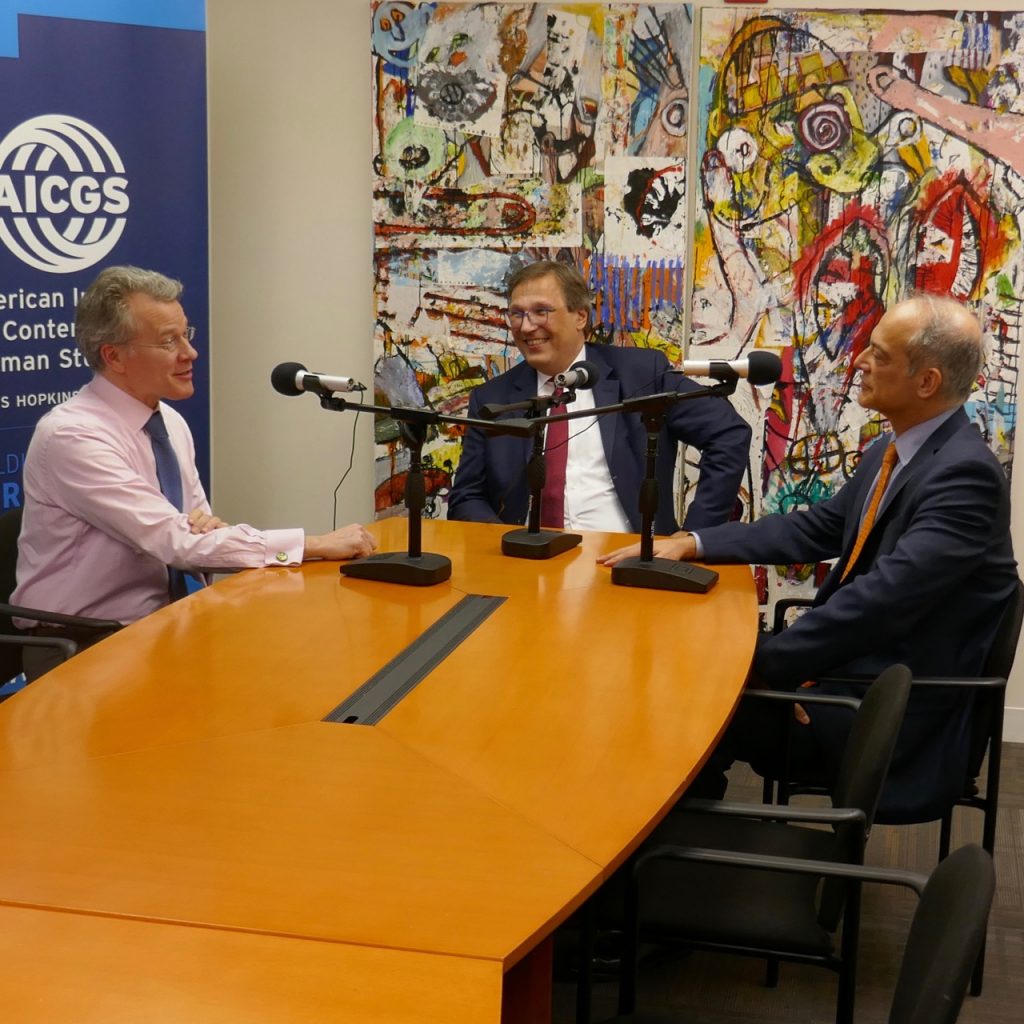Episode 05: Transatlantic Relations and the Evolving View of China

Jeff Rathke
President of AGI
Jeffrey Rathke is the President of the American-German Institute in Washington, DC.
Prior to joining AGI, Jeff was a senior fellow and deputy director of the Europe Program at CSIS, where his work focused on transatlantic relations and U.S. security and defense policy. Jeff joined CSIS in 2015 from the State Department, after a 24-year career as a Foreign Service Officer, dedicated primarily to U.S. relations with Europe. He was director of the State Department Press Office from 2014 to 2015, briefing the State Department press corps and managing the Department's engagement with U.S. print and electronic media. Jeff led the political section of the U.S. Embassy in Kuala Lumpur from 2011 to 2014. Prior to that, he was deputy chief of staff to the NATO Secretary General in Brussels. He also served in Berlin as minister-counselor for political affairs (2006–2009), his second tour of duty in Germany. His Washington assignments have included deputy director of the Office of European Security and Political Affairs and duty officer in the White House Situation Room and State Department Operations Center.
Mr. Rathke was a Weinberg Fellow at Princeton University (2003–2004), winning the Master’s in Public Policy Prize. He also served at U.S. Embassies in Dublin, Moscow, and Riga, which he helped open after the collapse of the Soviet Union. Mr. Rathke has been awarded national honors by Estonia, Latvia, and Lithuania, as well as several State Department awards. He holds an MPP degree from Princeton University and BA and BS degrees from Cornell University. He speaks German, Russian, and Latvian.
__

Peter S. Rashish
Vice President; Director, Geoeconomics Program
Peter S. Rashish, who counts over 30 years of experience counseling corporations, think tanks, foundations, and international organizations on transatlantic trade and economic strategy, is Vice President and Director of the Geoeconomics Program at AICGS. He also writes The Wider Atlantic blog.
Mr. Rashish has served as Vice President for Europe and Eurasia at the U.S. Chamber of Commerce, where he spearheaded the Chamber’s advocacy ahead of the launch of the Transatlantic Trade and Investment Partnership. Previously, Mr. Rashish was a Senior Advisor for Europe at McLarty Associates, Executive Vice President of the European Institute, and a staff member and consultant at the International Energy Agency, the World Bank, UN Trade and Development, the Atlantic Council, the Bertelsmann Foundation, and the German Marshall Fund.
Mr. Rashish has testified before the House Financial Services Subcommittee on International Monetary Policy and Trade and the House Foreign Affairs Subcommittee on Europe and Eurasia and has advised three U.S. presidential campaigns. He has been a featured speaker at the Munich Security Conference, the Aspen Ideas Festival, and the European Forum Alpbach and is a member of the Board of Directors of the Jean Monnet Institute in Paris and a Senior Advisor to the European Policy Centre in Brussels. His commentaries have been published in The New York Times, the Financial Times, The Wall Street Journal, Foreign Policy, and The National Interest, and he has appeared on PBS, CNBC, CNN, NPR, and the BBC.
He earned a BA from Harvard College and an MPhil in international relations from Oxford University. He speaks French, German, Italian, and Spanish.

Stefan Mair
German Institute for International and Security Affairs (SWP)
Dr. Stefan Mair is a director of the German Institute for International and Security Affairs and Executive Chairman of the Stiftung Wissenschaft und Politik (SWP). He studied Political Sciences, Economics and Sociology at the Ludwig Maximilians University in Munich. From 1989 to 1991 he held a scholarship from the ifo-Institute for Economic Research. He was subsequently awarded his doctorate in Political Sciences by the Ludwig Maximilians University in Munich. In the following years he worked as an advisor on Africa at the Foundation for Science and Politics (SWP), becoming head of the research group Africa and Middle East at the SWP in 1997.
From 2002 to 2010 he was a member of the management of the SWP and from 2007 to 2009 he also held the post of director of research. In 2010 Dr. Stefan Mair moved from the SWP to the Federation of German Industries (BDI) as a member of the Executive Board. From May to October he was head of the Department of International Markets. He rejoined SWP in 2020.
 China has represented opportunity—both geopolitical and economic—since its dramatic openings in the 1970s. There are, of course, the opportunities for China itself: hundreds of millions of people have escaped poverty as a result of economic growth in the forty years since reforms began in 1979. American, German, and other Western companies benefited from these reforms as well, investing hundreds of billions of dollars in the Chinese economy.
China has represented opportunity—both geopolitical and economic—since its dramatic openings in the 1970s. There are, of course, the opportunities for China itself: hundreds of millions of people have escaped poverty as a result of economic growth in the forty years since reforms began in 1979. American, German, and other Western companies benefited from these reforms as well, investing hundreds of billions of dollars in the Chinese economy.
There have also been other, more elusive, opportunities, including change in the Chinese political and economic systems: more open, a stronger rule of law, and a more constructive Chinese role in international affairs. This was the hope that China would become a “responsible stakeholder” in the world and see its interest in preserving and expanding the open, liberal order.
Today, the Chinese state is reasserting its preeminent role and Beijing is pursuing an ambitious foreign policy and a strengthened military capacity such that the United States now describes China as a “near-peer competitor.” It includes the massive Belt and Road Initiative, with pledges of $1 trillion in Chinese money for infrastructure and transportation investment to bring Chinese goods to the world. Annual Chinese outward investment now exceeds foreign investment in China.
The changing Chinese economic and political role has been raising concerns in Europe (as in the U.S.) and European countries have been instituting stricter screening of Chinese investments in strategic sectors, while also fighting back against Chinese state subsidies and the continuing problems of intellectual property theft and technology transfer. Against that backdrop, a new set of 54 recommendations by the Federation of German Industry, which represents 35 different German economic sectors, describes China as a “systemic competitor” and calls for German and European leaders to rise to this challenge through stronger measures at home and internationally.
In this episode of The Zeitgeist, Jeff Rathke and Peter Rashish talk with Stefan Mair, a member of the board of the Federation of German Industry, to discuss the evolving German view toward China, and what it means for cooperation at the European level and with the United States.
Host
Jeff Rathke, President, AGI
Guests
Stefan Mair, Member of the Executive Board, Federation of German Industries
Peter Rashish, Senior Fellow and Director of the Geoeconomics Program, AGI
Recent AGI publications on China
China’s BRI and Europe’s Response
Europe, China, and a Stable Indo-Pacific Order
If Not the Chinese Belt-and-Road, Then What? Navigating A Multitude of Visions for the Indo-Pacific and Beyond
Subscribe on iTunes, Spotify, Google Play, Tune In, and Stitcher.
Support for this episode is provided in part by the Steven Muller New Initiatives Fund.





